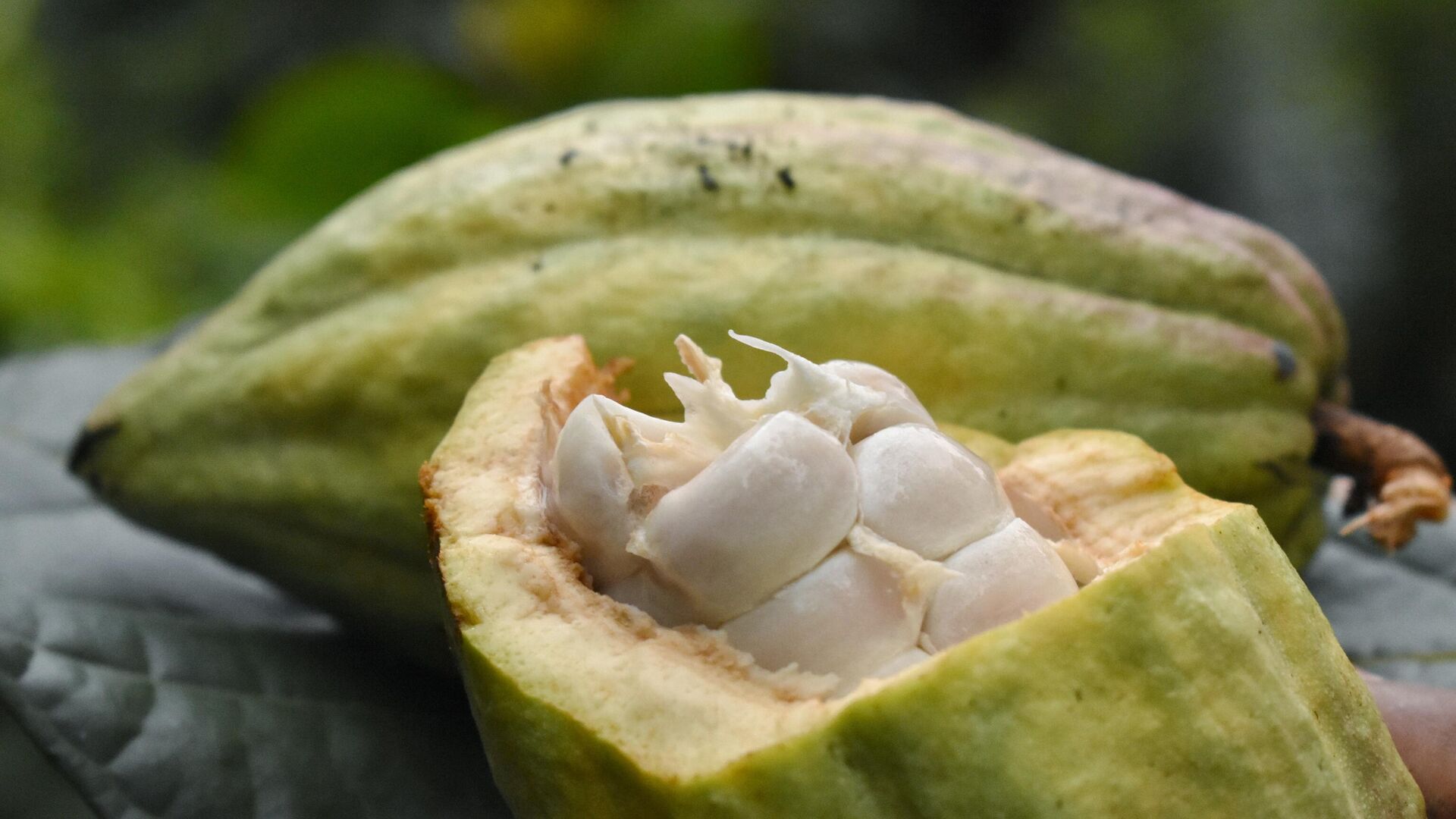https://en.sputniknews.africa/20240502/world-cocoa-prices-fall-below-9000-per-tonne-for-first-time-since-late-march-1066341467.html
World Cocoa Prices Fall Below $9,000 Per Tonne for First Time Since Late March
World Cocoa Prices Fall Below $9,000 Per Tonne for First Time Since Late March
Sputnik Africa
Cocoa beans fell even further on Thursday, hitting a low of $7,510 per tonne in the morning, ICE Futures data showed. However, since the second half of the... 02.05.2024, Sputnik Africa
2024-05-02T18:36+0200
2024-05-02T18:36+0200
2024-05-02T18:53+0200
sub-saharan africa
cocoa
trade
economy
west africa
prices
chocolate
nigeria
ghana
cote d'ivoire (ivory coast)
https://cdn1.img.sputniknews.africa/img/07e7/09/1e/1062458572_0:160:3072:1888_1920x0_80_0_0_99e827d56146dd0ce193ab4ea3814aad.jpg
May cocoa bean futures fell to $8,850 a tonne in Tuesday trading, the lowest since March 21, according to ICE Futures data.The cost of the raw material was below $9,000 for the last time on March 22.The most active contract in New York fell as much as 17% to $8,800 a tonne, the largest intraday drop on record since 1960.Overall, futures are down more than 20% from the record high reached on April 19 after more than doubling this year.Cocoa has become cheaper because traders are closing deals due to high margin requirements and because Nigeria has increased cocoa exports, the media revealed.The cash crunch is also reportedly forcing traders to delay purchases of beans from the world's largest producers, putting pressure on the cocoa market.In early February, the price of a tonne of cocoa beans rose to $5,000 for the first time since 1977. By mid-March, prices had doubled since the end of last year, and by the end of March, they had reached $10,000 for the first time in history.The price of cocoa beans, which has been rising steadily for the past two years, reached unprecedented highs in March, surpassing the $10,000 per tonne mark for the first time in history and increasing 2.4 times since the beginning of the year.The International Cocoa Organization reported in January that the two-year global cocoa bean deficit will continue into 2024, while shipping difficulties in the Red Sea will support the current trend of rising prices for the commodity.The increase in cocoa prices is also due to low yields in West Africa, where approximately 70% of the world's cocoa is grown. The low yields are caused by the El Niño weather phenomenon, an above-average sea surface temperature in the Pacific Ocean that affects global climate conditions, causing higher temperatures and heavy rainfall in the region.
https://en.sputniknews.africa/20240331/what-caused-price-of-cocoa-beans-to-rise-and-what-can-it-lead-to-1065850356.html
west africa
nigeria
ghana
cote d'ivoire (ivory coast)
Sputnik Africa
feedback@sputniknews.com
+74956456601
MIA „Rossiya Segodnya“
2024
Maxim Grishenkin
https://cdn1.img.sputniknews.africa/img/07e7/0a/17/1063018107_0:0:1104:1103_100x100_80_0_0_03090c85a11f5d2e8a19cf1d989443c9.jpg
Maxim Grishenkin
https://cdn1.img.sputniknews.africa/img/07e7/0a/17/1063018107_0:0:1104:1103_100x100_80_0_0_03090c85a11f5d2e8a19cf1d989443c9.jpg
News
en_EN
Sputnik Africa
feedback@sputniknews.com
+74956456601
MIA „Rossiya Segodnya“
Sputnik Africa
feedback@sputniknews.com
+74956456601
MIA „Rossiya Segodnya“
Maxim Grishenkin
https://cdn1.img.sputniknews.africa/img/07e7/0a/17/1063018107_0:0:1104:1103_100x100_80_0_0_03090c85a11f5d2e8a19cf1d989443c9.jpg
cocoa, trade, economy, west africa, prices, chocolate, nigeria, ghana, cote d'ivoire (ivory coast)
cocoa, trade, economy, west africa, prices, chocolate, nigeria, ghana, cote d'ivoire (ivory coast)
World Cocoa Prices Fall Below $9,000 Per Tonne for First Time Since Late March
18:36 02.05.2024 (Updated: 18:53 02.05.2024) Cocoa beans fell even further on Thursday, hitting a low of $7,510 per tonne in the morning, ICE Futures data showed. However, since the second half of the day, futures have been trading above $8,000.
May cocoa bean futures fell to $8,850 a tonne in Tuesday trading, the lowest since March 21, according to ICE Futures data.
The cost of
the raw material was below $9,000 for the last time on March 22.
The most active contract in New York fell as much as 17% to $8,800 a tonne, the largest intraday drop on record since 1960.
Overall, futures are down more than 20% from the record high reached on April 19 after more than doubling this year.
The cost of cocoa beans peaked on April 19 at $11,878 per tonne.
Cocoa has become cheaper because traders are closing deals due to high margin requirements and because Nigeria has increased cocoa exports, the media revealed.
The cash crunch is also reportedly forcing traders to delay purchases of beans from the world's largest producers, putting pressure on the cocoa market.
In early February, the price of a tonne of cocoa beans rose to $5,000 for the first time since 1977. By mid-March,
prices had doubled since the end of last year, and by the end of March, they had reached $10,000 for the first time in history.
The price of cocoa beans, which has been rising steadily for the past two years, reached unprecedented highs in March, surpassing the $10,000 per tonne mark for the first time in history and increasing 2.4 times since the beginning of the year.
The International Cocoa Organization reported in January that the two-year global cocoa bean deficit
will continue into 2024, while shipping difficulties in the Red Sea will support the current trend of rising prices for the commodity.
The increase in cocoa prices is also due to low yields in West Africa, where approximately 70% of the world's cocoa is grown. The low yields are caused by the El Niño weather phenomenon, an above-average sea surface temperature in the Pacific Ocean that affects global climate conditions, causing higher temperatures and heavy rainfall in the region.



